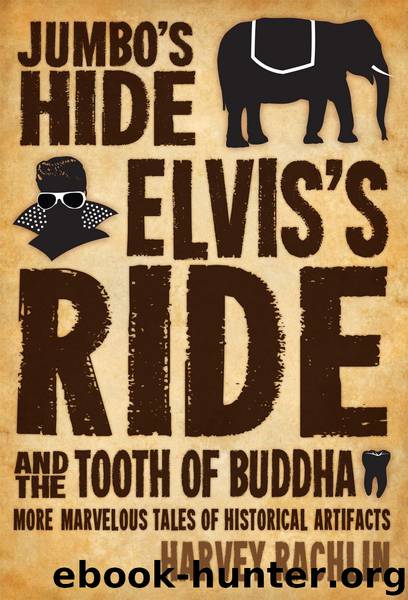Jumbo's Hide, Elvis's Ride, and the Tooth of Buddha by Harvey Rachlin

Author:Harvey Rachlin
Language: eng
Format: mobi, epub
ISBN: 9781939430090
Publisher: Garrett County Press
Published: 2013-08-08T21:00:00+00:00
The Emancipation Proclamation, President Abraham Lincoln’s hallowed manifesto of liberty and freedom, is a curious anomaly. After the states of the South seceded from the United States to form the Confederate States of America, the North was faced with a vexing political question: Should the overriding goal of the Civil War be to abolish slavery, or to preserve the Union? Even many opponents of slavery in the North believed preservation was the more crucial issue, and the president had to walk a careful line between the two factions so as not to alienate either the preservationists or the abolitionists; he needed the support of both groups to preserve the Union and end slavery.
Indeed, Lincoln was adamantly opposed to slavery, but he was also a pragmatist. In his August 22, 1862, letter (Wadsworth Atheneum, Hartford, Connecticut) to Horace Greeley, editor of the New York Tribune, Lincoln wrote:
My paramount object in this struggle is to save the Union, and is not either to save or to destroy slavery. If I could save the Union without freeing any slave I would do it, and if I could save it by freeing all the slaves I would do it; and if I could save it by freeing some and leaving others alone I would also do that. What I do about slavery, and the colored race, I do because I believe it helps to save the Union; and what I forbear, I forbear because I do not believe it would help to save the Union. I shall do less whenever I shall believe what I am doing hurts the cause, and I shall do more whenever I shall believe doing more will help the cause.
Lincoln clearly understood that he had to save the Union before he could help the slaves; the preservation of the Union was his top priority.
With military and political considerations dictating caution, Lincoln’s Emancipation Proclamation went through various drafts, from an initial working paper in which he expressed some ideas on the subject to a Preliminary Proclamation, which essentially functioned to serve notice to the people engaged in rebellion against the United States, to a final proclamation in which, political considerations notwithstanding, he called for an end to slavery in the rebel states. Ironically, although in theory the final proclamation severed the chains of bondage that enslaved the American Negro in rebel states, in reality it did not free a single slave. Still, the Emancipation Proclamation transformed the Civil War into a battle for liberty and democracy and became an enduring symbol of freedom. It was a written affirmation of the Union’s dedication to the cause of freedom and liberty, a message to the entire world that human subjugation would not be allowed.
Slavery had been an integral part of American society since colonial times. Ships transported Negroes from Africa, captured mostly from the western section of the continent, and by the beginning of the eighteenth century, their import composed a thriving trade made up of mainly American and British concerns.
Over time
Download
Jumbo's Hide, Elvis's Ride, and the Tooth of Buddha by Harvey Rachlin.epub
This site does not store any files on its server. We only index and link to content provided by other sites. Please contact the content providers to delete copyright contents if any and email us, we'll remove relevant links or contents immediately.
Periodization Training for Sports by Tudor Bompa(8254)
The Body: A Guide for Occupants by Bill Bryson(5082)
The MacArthur Bible Commentary by John MacArthur(4823)
The Sports Rules Book by Human Kinetics(4379)
What It Really Takes to Get Into Ivy League and Other Highly Selective Colleges by Hughes Chuck(3752)
Marijuana Grower's Handbook by Ed Rosenthal(3677)
The Sprouting Book by Ann Wigmore(3587)
The Martian by Andy Weir(3418)
Salt, Fat, Acid, Heat: Mastering the Elements of Good Cooking by Nosrat Samin(3146)
Sapiens and Homo Deus by Yuval Noah Harari(3068)
The Bread Bible by Rose Levy Beranbaum(3066)
Harry Potter 4 - Harry Potter and The Goblet of Fire by J.K.Rowling(3061)
The Marketing Plan Handbook: Develop Big-Picture Marketing Plans for Pennies on the Dollar by Robert W. Bly(3055)
Classic by Mary Berry(3011)
Martha Stewart's Baking Handbook by Martha Stewart(2854)
Screenplay: The Foundations of Screenwriting by Syd Field(2636)
The Plant Paradox by Dr. Steven R. Gundry M.D(2611)
50 Economics Classics by Tom Butler-Bowdon(2568)
The Cambridge Grammar Of The English Language by Rodney Huddleston Geoffrey K. Pullum(2429)
